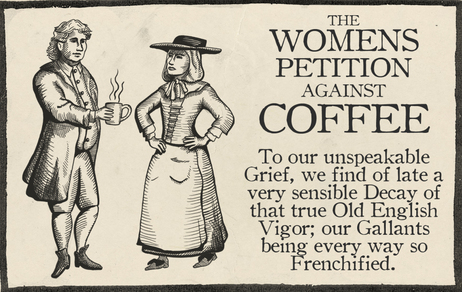In their experiment, scholars administered a 10-question Graduate Management Aptitude Test (GMAT - the analytical portion of a computer adaptive test required by many graduate schools) in a computer lab to about 100 undergraduate business students, divided into two groups. One group took the test in the presence of an ambient coffee-like scent, while a control group took the same test - but in an unscented room.
They found that the group in the coffee-smelling room scored significantly higher on the test. Was the first group's boost in quick thinking be explained, in part, by an expectation that a coffee scent would increase alertness and subsequently improve performance?
Take that, English women.

Link: Banning Coffee Didn't Make The French Less French via Adam Cole at NPR
The team designed a follow-up survey, conducted among more than 200 new participants, quizzing them on beliefs about various scents and their perceived effects on human performance. Participants believed they would feel more alert and energetic in the presence of a coffee scent, versus a flower scent or no scent; and that exposure to coffee scent would increase their performance on mental tasks. The results suggest that expectations about performance can be explained by beliefs that coffee scent alone makes people more alert and energetic.
"It's not just that the coffee-like scent helped people perform better on analytical tasks, which was already interesting," says Stevens School of Business professor Adriana Madzharov. "But they also thought they would do better, and we demonstrated that this expectation was at least partly responsible for their improved performance."
In short, smelling a coffee-like scent, which has no caffeine in it, has an effect similar to that of drinking coffee, suggesting a placebo effect of coffee scent.
Madzharov, whose research focuses on sensory marketing and aesthetics, is looking to explore whether coffee-like scents can have a similar placebo effect on other types of performance, such as verbal reasoning. She also says that the finding - that coffee-like scent acts as a placebo for analytical reasoning performance - has many practical applications, including several for business.






Comments